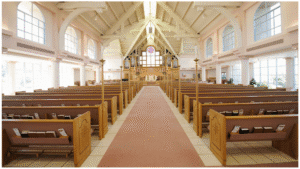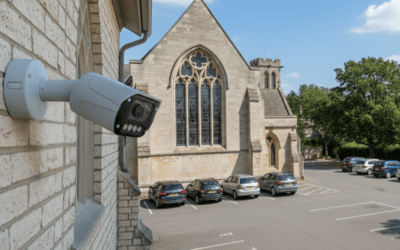Introduction
A security grant for churches can make a crucial difference in protecting faith-based facilities across the country. As safety concerns grow, many religious organizations are seeking financial assistance to strengthen their security infrastructure.
From small community churches to large synagogues and mosques, leaders are recognizing the importance of improving access control, surveillance, and emergency communication systems to protect their members and property.
The good news? Federal and state grant programs—like the Nonprofit Security Grant Program (NSGP)—are available to help fund these essential security upgrades.
In this article, we’ll explain how to apply for a security grant for churches or other faith-based facilities, what to expect during the process, and the steps that can improve your chances of approval. Whether your goal is to install a video surveillance system, add access control, or enhance your alerting systems, this guide will help you plan effectively and secure funding for your project.
Article Summary
FEMA’s Nonprofit Security Grant Program (NSGP) helps churches and faith-based nonprofits strengthen physical security.
- Eligible upgrades include access control, video surveillance, and emergency communication systems such as handheld radios, mass notification, and PA systems.
- You’ll need a risk assessment and an investment justification outlining specific threats and proposed improvements.
- Each state (Florida, Georgia, Tennessee, etc.) manages its own grant submission process and deadlines.
- Avoid common application errors like missing documents or unclear project goals.
Free Resource: Checklist for Getting a Security Grant for Churches
Preparing to apply for a grant? Start with our free Security Checklist for Faith-Based Facilities to evaluate your current risks and identify funding priorities.
Download the ChecklistUnderstanding Security Grants for Churches
Faith-based organizations can often qualify for funding under the Nonprofit Security Grant Program (NSGP) administered by FEMA through state agencies. These grants are designed to help nonprofits enhance their physical security and preparedness against potential threats.
Eligible organizations include:
- Churches, synagogues, mosques, and temples
- Faith-based schools and community centers
- Nonprofits with missions aligned with public interest or religious outreach
Funds can typically be used for:
- Access control systems and keyless entry
- Video surveillance (CCTV/VMS) systems
- Perimeter fencing and lighting
- Intrusion detection and alarm systems
- Emergency communications systems such as handheld radios, mass notification systems, and PA systems for warnings
- Security planning and tabletop exercises
- Contracted security personnel and volunteer training
To learn more about implementing these upgrades, visit our Video Surveillance Solutions, Access Control Systems, or Emergency Communication Solutions pages.
Why Security Grants Matter for Faith-Based Facilities
Many faith communities operate on limited budgets, making it difficult to allocate funds toward safety improvements. Security grants make it possible to implement professional-grade systems without diverting funds from ministry programs or outreach efforts.
Key benefits include:
- Improved safety: Deters theft, vandalism, and active threats.
- Faster emergency response: With integrated mass notification and handheld radio systems, staff can communicate instantly during an incident.
- Community reassurance: Builds trust among members and visitors.
- Long-term savings: Prevents costly losses and insurance claims.
When combined with the right security partner, grants allow you to create a safer, more secure worship environment without financial strain.
How to Apply for a Security Grant for Churches
While each state has its own process, the general steps are similar across programs like FEMA’s NSGP. Here’s a step-by-step overview:
- Identify Eligibility
Start by confirming that your organization qualifies as a nonprofit and faith-based entity. Most churches meet this requirement.
- Conduct a Risk Assessment
Prepare a threat and vulnerability assessment outlining potential security risks. This document forms the foundation of your grant application and helps justify funding needs.
- Define Your Project Scope
Decide which security improvements are most critical. Examples include:
- Installing security cameras to monitor entrances
- Adding keycard access control for restricted areas
- Integrating emergency communication systems like PA systems or mass notification for real-time alerts
- Deploying intrusion detection alarms for after-hours protection
- Write the Investment Justification
Your application will include a narrative explaining why your project is necessary, how it addresses specific threats, and how it will improve overall security.
- Submit to the State Administrative Agency (SAA)
Applications are typically submitted to your state’s homeland security office, which then reviews and forwards eligible applications to FEMA.
- Implement and Report
Once approved, you’ll receive funds to begin implementation. You’ll also need to track progress and report back on outcomes.
For specific guidance, your state’s emergency management website (Florida, Georgia, Tennessee, etc.) will provide forms, deadlines, and contact information.
Resources: State-by-State for Getting a Security Grant for Churches
Florida
The Florida Division of Emergency Management (FDEM) manages NSGP submissions within the state. Visit: https://www.floridadisaster.org Tip: Florida’s application window typically opens in early spring. Prepare your threat assessment early to stay ahead.
Georgia
The Georgia Emergency Management and Homeland Security Agency (GEMA/HS) coordinates FEMA’s nonprofit grants. Visit: https://gema.georgia.gov Tip: GEMA emphasizes community preparedness and partnerships — include how your project benefits both your facility and the surrounding community.
Tennessee
The Tennessee Department of Military – Tennessee Emergency Management Agency (TEMA) handles the NSGP process. Visit: https://www.tn.gov/tema Tip: Tennessee reviewers focus on clarity and justification — ensure your investment justification is detailed and specific.
Common Mistakes to Avoid
Even strong applications can be rejected due to avoidable errors. Watch out for these common pitfalls:
- Submitting incomplete or outdated risk assessments
- Requesting ineligible expenses (e.g., weapons, vehicles, uniforms)
- Missing the submission deadline
- Failing to clearly connect project goals to identified threats
- Ignoring post-award compliance and reporting requirements
Working with an experienced security integrator can help ensure your proposal and scope meet all requirements before submission.
Need Help Writing or Scoping Your Security Grant Project?
Facility Protection Group helps faith-based organizations design compliant security solutions that meet FEMA’s Nonprofit Security Grant standards. Our team provides site assessments, system recommendations, and documentation support — helping you submit a clear, fundable proposal.
Closing Thoughts
Securing a security grant for your church doesn’t have to be overwhelming. With proper preparation, risk assessment, and guidance from trusted professionals, your faith-based organization can obtain the funding it needs to safeguard your congregation and property.
To learn more about professional-grade video surveillance, access control, and emergency communication systems for churches and nonprofits, visit our Security Solutions for Houses of Worship page.
FAQs About Security Grant for Churches
How much funding can our church receive?
Under FEMA’s Nonprofit Security Grant Program (NSGP), eligible facilities can typically receive up to $150,000 per location for physical security enhancements. State-level programs may vary, so check with your State Administrative Agency (SAA) for exact limits.
What types of expenses are covered?
Allowable costs include CCTV/VMS systems, access control, and
emergency communications (such as handheld radios, PA systems, and mass notification), fencing, lighting, and security training. Operational or staffing costs are usually not eligible.
Do we need to hire a consultant?
While not required, many churches find it helpful to work with a security professional who understands how to align system design with FEMA’s standards and documentation. This can increase your chance of approval and streamline your grant process.
How long does it take to receive funding?
The process can take several months from submission to approval. Once awarded, projects usually must be completed within 36 months. Be sure to plan your project timeline accordingly.
Can multiple facilities under the same organization apply?
Yes, each separate facility can submit its own application if it has a distinct address and an Employer Identification Number (EIN). This allows multi-campus organizations to
secure funding for multiple locations.




